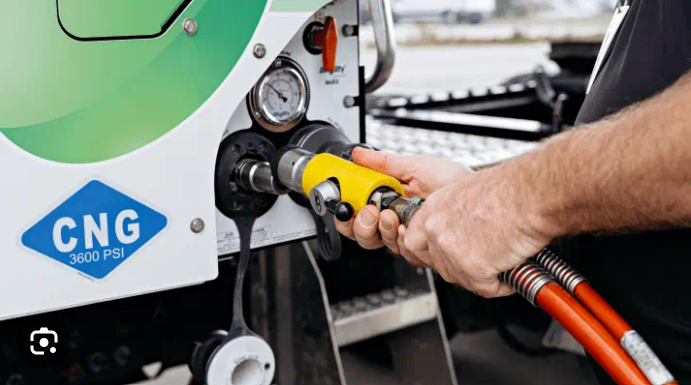The Nigerian government’s recent efforts to promote Compressed Natural Gas (CNG) as an economical and environmentally friendly alternative to petrol face significant hurdles, largely due to an insufficient number of refuelling stations across the country. While the initiative is gaining traction among motorists, the shortage of accessible CNG stations is causing frustration and logistical difficulties for users.
Rising Interest in CNG Amid High Petrol Costs
In response to rising petrol prices, many Nigerian motorists have been converting their vehicles to CNG, recognizing it as a cost-saving solution. The cost benefits are clear; CNG is cheaper and less polluting than petrol. However, this economic alternative comes with its own set of challenges, as some motorists find themselves struggling to locate refuelling stations.
Aisha Umar, an Abuja resident, recounted her frustration in finding CNG for her converted car: “I have been making efforts to refill my car for the past four days, but there is no gas in the station close to me at Durumi, Abuja, except I drive to Airport Road.” This lack of access to nearby refuelling options has left motorists feeling as if they’ve traded one challenge for another.
Current Infrastructure and the Shortage of CNG Refuelling Stations

In July 2024, the federal government inaugurated six refuelling stations in Abuja and several others in Lagos. However, these stations have proven inadequate for the growing number of CNG users in these areas. Many motorists report driving substantial distances to reach the nearest CNG station, while some areas have no stations at all, leaving drivers reliant on petrol.
Henry Orji, a businessman at Abuja’s Gudu Market, shared that he initially benefited from CNG’s affordability but had to revert to petrol due to the scarcity of CNG refuelling stations. “Refilling my car with CNG is really cheap compared to fuel, and I’ve saved some money since I started using it. But getting it is not as convenient as fuel,” he said.
Cost of Conversion: A Deterrent for Widespread Adoption
Beyond the infrastructure issues, the high conversion costs are discouraging many Nigerians from making the switch to CNG. The current cost of converting a vehicle ranges from ₦600,000 to ₦1,200,000, depending on the size and type of vehicle. This upfront expense is a barrier for many who might otherwise be interested in CNG.
To address these challenges, the government has introduced measures to help make CNG conversion more accessible. According to Micheal Oluwagbemi, Programme Coordinator for the Presidential Compressed Natural Gas Initiative (PCNGI), the government is working with private sector partners to develop products aimed at reducing conversion costs. Additionally, a partnership between the Nigerian Consumer Credit Corporation (CREDICORP) and PCNGI has launched a ₦10 billion Credit Access for Light and Mobility (CALM) fund. This fund will offer credit facilities to make CNG conversions more affordable, potentially easing the financial barrier for many Nigerians.
Addressing Safety Concerns and International Comparisons
SEE ALSO: Nigerian Government Introduces Payment Plan for CNG Conversion
The Nigerian government is also addressing public concerns over the safety of CNG vehicles following Malaysia’s recent announcement to phase out natural gas for vehicles by July 2025. Malaysia’s decision has raised concerns among Nigerians about the potential risks associated with CNG. In response, Bayo Onanuga, Special Adviser to President Bola Tinubu on Information and Strategy, clarified that Malaysia’s ban pertains to Liquefied Petroleum Gas (LPG) vehicles, not CNG. He noted that CNG is considered safer and more cost-effective than LPG, and that Nigeria specifically chose CNG for these reasons.
Onanuga highlighted Malaysia’s struggles with their CNG adoption, which saw only a 0.2 percent conversion rate over 15 years due to similar challenges. Nigeria’s initiative, however, focuses on CNG as a unique solution to reduce fuel costs and carbon emissions while maintaining safety.
Looking Ahead: Future Prospects and Required Investments
For Nigeria’s CNG initiative to succeed, significant investment in refuelling infrastructure will be essential. Additional CNG stations are necessary to make the switch feasible for more Nigerians, as the current infrastructure has proven insufficient for growing demand. The government may need to incentivize private sector participation to expand the refuelling network, particularly in underserved regions.
The future of Nigeria’s CNG program holds promise if infrastructure, affordability, and accessibility issues are addressed. As the government works to mitigate these challenges through partnerships and financial assistance programs, the initiative has the potential to not only reduce transportation costs for Nigerians but also contribute to the country’s environmental goals. With continued investment and planning, CNG could become a reliable, long-term alternative to petrol, benefitting both Nigerian motorists and the national economy.



